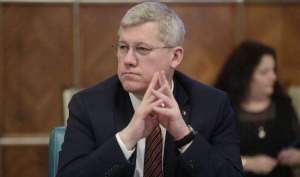• Interview with Mr. Bogdan Chiriţoiu, the president of the Competition Council
• "Oltchim can obtain a substantial state bailout"
Reporter: Dear Mr. President, please give us a list of the investigation which the Competition Council intends to complete this year?
Bogdan Chiriţoiu: I have hope that in the first part of 2013, we will complete the investigations concerning the manipulation of the ROBOR interest rate, the price of oil, the pricing of food in the retail sector and perhaps the one concerning the management of electronic waste, with the latter depending on its freezing by the court. The investigation of the food retail sector has been completed by the corresponding division and will now be followed by the specific procedures: hearings, recess.
Also, for the first part of 2013, we plan to complete the useful investigations - the sectoral investigations concerning electricity and bank cards (the commissions that banks levy from the retailers who have installed POSs). For the second part of the year, we are looking at the investigations on the energy traders who have concluded bilateral contracts with Hidroelectrica and the ones concerning the asphalting of the roads.
Reporter: What can you tell us about the investigation concerning the manipulation of the money market index of October 2008?
Bogdan Chiriţoiu: Under normal circumstances, I think that we would make this investigation public in the beginning of this year, maybe even in January 2013. We have completed the investigation report, it has been debated in Brussels, we have consulted with the regulator, we have reviewed it two times in the Council, and now it's being discussed in the plenum.
In this particular case, we need to decide whether we are dealing with the banks getting together as a cartel, or as a reaction to the market conditions that existed at that time. Some of the banks are suspected of having manipulated the index of the monetary market, namely the interbank interest rate.
The decisions which the National Bank of Romania made at the time were very harsh, as the Central Bank is in charge of the oversight of the banking system, especially since the shocks could have affected the real economy.
But what we are investigating is different from what the NBR does. We want to see whether an agreement existed between the banks at that time, and the NBR has sought to diminish the impact of the crisis on the banking system and the economy.
Reporter: What can you tell us about the investigation concerning the fuel market?
Bogdan Chiriţoiu: We are working on an investigation concerning the fuel market, but it concerns actions which took place before Romania's accession to the EU. It is a remnant of the case in which we levied record fines of over 200 million Euros early last year.
We have focused on preparing for court this case concerning the removal from the market of a certain variety of gas. We are the only ones in Europe who succeeded in finding evidence concerning an understanding between the oil companies (on the horizontal) and in punishing them.
The priority of the Competition Council was the defense of the oil companies who disputed this type of fine. It is our legal department that is handling this case; we do not use law firms, as stipulated by the legislation in effect.
The courts did not accept the suspension of the fine levied on the oil companies, which they would do a few years ago. Over the last few years however, the courts have become more restrictive, which made us happy. As a result, last year, the ANAF collected the entire amount of the fine. But it is very important that we win the case in court.
Reporter: How many investigations did the Competition Council begin in 2012?
Bogdan Chiriţoiu: Between January-November 2012, we have begun 19 investigations concerning the violation of the competition law, of which 16 at the initiative of the Competition Council. The number of investigations is down slightly compared to 2011 because we are focusing on completing the ongoing investigations. We have also begun 3 sectoral probes, which will review the following: the market for the distribution of movies to Romanian movie theaters, the natural gas sector in Romania and the nationwide sanitation services.
Thus, at the end of December we had 71 ongoing investigations and 9 sectoral probes.
Reporter: How many investigations did you complete in 2012? What amount of fines did you levy in 2012?
Bogdan Chiriţoiu: In 2012 we have completed 22 investigations, and 30 other investigations are at advanced stages. The amount of the levied fines is 30.21 million lei, (approximately 6.7 million Euros). Four companies were fined 25,464,865 lei (approximately 5.6 million Euros) for rigging two calls for tenders held by TRANSGAZ Mediaş: CONDMAG SA - 4,548,658 lei (1 million Euros), INSPET - 7,296,204 lei (1.6 million Euros), MOLDOCOR- 2,235,028 lei (500,000 Euros), TMUCB -11,384,975 lei (2.5 million Euros).
Five companies were fined 3,010,705 lei (approximately 663,326 Euros) for rigging a call for tenders organized by CNADNR: Plastidrum - 1,564,619.35 lei; Signature Semnalizare - 11,573.35 lei; Swarco România - 33,012.00 lei; Swarco Heoscont Strassenmarkierung GmbH of Austria - 1,192,167.46 lei; Eleftherios Kokkinakis LTD din Grecia - 209,333.45 lei.
Do-Fi East Holding GmbH Austria was fined 1.064.827 lei (approximately 263,628 Euro) for going ahead with a merger before obtaining the approval of the competition authority.
A fine of 593,089 lei (approximately 131,798 Euros) was levied on the Romanian National Union of Court Enforcers (UNEJ), and two companies were fined 80,323 lei (approximately 7,850 Euros) for providing inaccurate information as part of the investigation on the road signs markets, awarded by the Romanian Company for National Roads and Highways (CNADNR). The Competition Council has also levied fines of 3,041 lei on two companies for providing incomplete information, and failing to provide information, respectively, as part of the investigation to distribute movies to movie theaters, and 3,000 lei for disloyal competition.
Reporter: Have you received any complaints from Discovery Networks concerning the removal from the roster of channels offered by RCS/RDS?
Bogdan Chiriţoiu: Discovery has submitted a notification concerning the removal from the channel roster of RCS/ RDS. We have also received a notification from the National Audio-Visual Council in that regard, as well as 3 petitions from customers.
This scandal is part of the long series of complaints filed by cable operators and TV channels.
The platforms are rather concentrated on the Romanian market, and, even if the merger between UPC and RCS did not go through, a consolidation process on this segment did occur.
Both the platforms, and the TV stations have market strength, and that is why there have been conflicts between them for a few years now. I think that this is an area which the Competition Council should watch more closely, because these platforms are providing bundled services - telephony, internet, TV etc. But, on the other hand, the TV stations aren't the "helpless victims" in this scandal.
The Competition Council is not a regulator. My opinion is that it shouldn't rush to jump into the fight. We need to be an institution that has more strength over a longer term- 5 years for opening an investigation, 10 years for punishing a deed. The Competition Council can pursue someone for a long time. But I will admit that we shouldn't leave the victim to die before we intervene.
Before acting, the Competition Council has to allow the market to self-regulate. However, there are times where this doesn't happen and that's where we come in.
If there is a commercial conflict, like the one between the TV stations and the platforms, I would be tempted not to intervene. Sometimes, the very complaints sent to the Council are used as means of bargaining, which we are not happy with.
Citizens now have the ability to change cable providers if they dislike them. Fortunately, there is now the satellite which allows migrating to other operators.
And if the platform isn't offering you the channels which are stipulated in the contract, citizens should resort to the courts, or to the consumer protection authority.
Reporter: How far along is the project conducted together with the World Bank to increase the efficiency of the Council?
Bogdan Chiriţoiu: As part of the project "Improving the efficiency of the activity for the application of the competition policies in correlation with the sectoral policies", the Competition Council receives specific consulting from the World Bank. The project has four components: the revision and the passing of the legislative framework concerning market competition, the reinforcement of the competition advocacy activities in the public and government organisms, the implementation of a new business architecture at the level of the Competition Council and increasing the human resources capability. Currently, the representatives of the Council are working with the experts of the World Bank on the implementation of the project, which is set to be completed in the beginning of next year.
Reporter: You've repeatedly complained that you don't have enough qualified staff for all the investigations. Have you made any progress in that regard?
Bogdan Chiriţoiu: We have succeeded in hiring three economists, a requirement of the European Commission, and we are hoping that as such, we will form "the economic analysis unit". What we want at this time, is that, aside conducting market studies and research, to also support the investigation teams by conducting the economic analysis of the cases.
Also, considering that we have taken over new activities, (the Railway Oversight Council from the Ministry of Transports and the management of the law on unfair competition from the Ministry of Finance) we have obtained an exemption from the rule which has frozen hirings in the public sector and, as a result, we have under way the procedures for the hiring of specialists in these areas.
We have difficulty hiring lawyers, which represents a problem, given the fact that the number of lawsuits has increased by more than 20%.
Reporter: What can you tell us about the Railway Oversight Council which you have taken over from the Ministry of Transports?
Bogdan Chiriţoiu: It is our first foray into the regulation segment. In fact, we are sort of a semi-regulator, at the moment. Over there we have a natural monopoly that is regulated- the railroad network managed mostly by SNCFR SA and the Railroad Council needs to make sure that the monopoly does not discriminate between the various railroad operators in terms of the access, especially against the ones operating in the freight sector.
We will also see if we are going to take the next regulation step, which means setting the tariff for the use of the railroad, which is currently set by the Government. So far, the Railroad Council has only had a consulting role in setting the price.
Reporter: A few years ago, the Competition Council drew up a material which would serve as the foundation for a draft law which would eliminate the favoring of the National Lottery and the creation of an independent regulatory authority. What is the current status of this project?
Bogdan Chiriţoiu: The creation of the independent authority for the regulation of gambling was a suggestion of ours, but the decision obviously lies with the government.
But, the Competition Council has under way an investigation concerning the possible anti-competitive practice between CN Loteria Română, SC Lotrom, SC Intracom and SC Intralot concerning the organization and the exploitation of the game of chance Video Lottery. The investigation was initiated (of our own initiative) in March 2012, when we also conducted an unannounced audit at the offices of the companies involved. Currently, we are reviewing the documents which were seized during the inspection. We are also cooperating with the European Commission, which is interested in the contract between these companies, as a potential state aid.
Reporter: What is the situation of the investigation concerning a potential abuse of dominating position by SC Hewlett - Packard România?
Bogdan Chiriţoiu: The investigation concerning a possible abuse of dominating position by HP Romania was started in March 2012 and we hope to complete it in 2013. In this case, we suspect a possible abuse of its dominant position by HP România, which manifested in the form of discrimination against one of its contractual partners.
Reporter: The call for tenders held by the ANCOM for the frequency bands was completed without the entry of any new operator on the market. Would such entries have been beneficial for the competitive environment on the mobile communications market?
Bogdan Chiriţoiu: Indeed, on the telecom market, the key event of 2012 was the call for tenders through which the frequency bands were allocated for the next 15 years. The Competition Council had an important part: we have convinced the Ministry and the regulator to apply rules which have allowed for greater market competition. We have four operators present on the telecom market and we have left in a back-door for more operators entering the market; considering that the licenses are granted for a period of 15 years, there was the risk of the market freezing for a long period of time, for a very dynamic industry. That is why it is very important for us to have the possibility of having other operators enter the market, aside from the four who won the licenses as part of the call for tenders.
Reporter: What is the current status of the state aid package that Oltchim wants?
Bogdan Chiriţoiu: We went to Brussels, we said that we want to provide aid to the plant, starting from 20 million Euros. The European Commission asked us for further information, and the Ministry of Economic Affairs is going to send that data.
"Oltchim" Râmnicu Vâlcea can obtain a substantial state aid, but this needs to be well justified, there needs to be a real restructuring plan.
Reporter: What can you tell us about the relationship of the Council with the regulators?
Bogdan Chiriţoiu: We've had a very good history of cooperation with the ANCOM and we would like to develop that kind of model with other regulators. The energy sector is very important for us, especially since it is in the process of liberalization. The relationship of the Competition Council with the National Authority for the Regulation of the Energy Market (ANRE) has improved over time. Cooperation between institutions isn't exactly part of the Romanian culture, but the law requires us to do that, and an Advisory Council has even been created at the ANRE, which we are also part of.
Both of us - the Competition Council and the ANRE - have common areas of operation, especially when it comes to the areas of renewable energy, where we need to cooperate to prepare the notification for the European Commission. It's from that that we should build the cooperation with the ANRE on other segments.
Reporter: Thank you!



























































